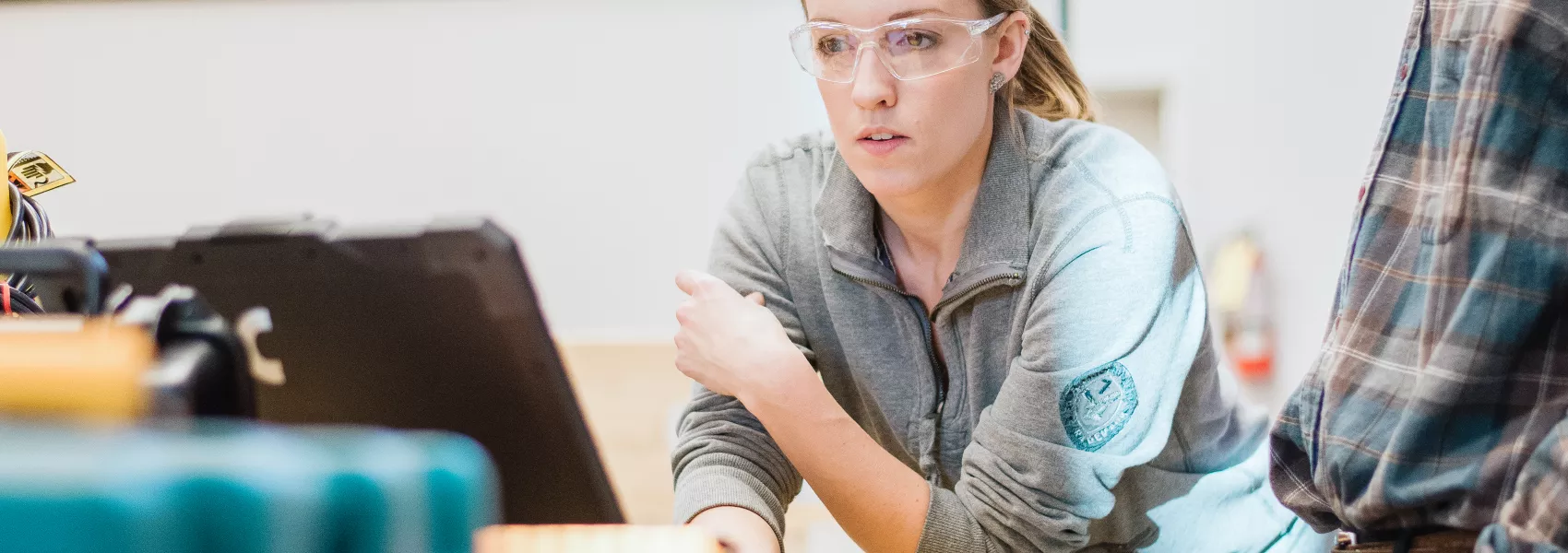
Civil Engineering
As a civil engineer, you will help people get where they need to go and design the spaces where everyone lives, works and plays. You will learn how to design and maintain buildings and other infrastructure essential to modern society while applying the principles of environmentally responsible development.
153 credits, 4 Years,
Part-time available
Program Details
Build a foundation in sciences, engineering design process and environmental issues in your first two years. In the final two years, you will develop an in-depth knowledge of civil engineering, including further exposure to practical engineering problems through a capstone design project.
Design courses begin in your first year, giving you the chance to engage your creative thinking. You will hone your problem-solving skills as you continue to take design courses in every year of your program.
In technical courses, you will learn about structural design, soil mechanics, geotechnical engineering, transportation and environmental engineering. Develop your professional skills in courses focusing on technical writing, teamwork, project management, professional ethics and engineering economics.
Courses use a variety of methods including group learning, team teaching and the use of modern design suite software.
A hallmark of your UNBC degree is experiential learning, which includes many hands-on laboratories, real-world design projects and undergraduate research projects with our world-class engineering research professors.
Career Paths
- Civil engineer
- Municipal engineer
- Geotechnical engineer
- Construction management
- Structural engineer
- Transportation engineer
- Water resources engineer
Why at UNBC
- Obtain the academic qualification to become a licensed Professional Engineer
- Experience what it takes to run an engineering firm as you develop business, team-working, problem-solving and management skills
- Participate in hands-on specialized instruction in structural, cold climate, and geotechnical engineering
- Multiple opportunities to think creatively and develop your problem-solving skills in design courses in every year of the program
- Learn to consider the environmental impact and economic sustainability in modern infrastructure development
- Take advantage of co-operative education and research experience opportunities
- Engage with professors and friends in small classes
'En Cha Huná
UNBC’s motto, from the Dakelh (Carrier) Elders, reminds us that all people have a voice and a viewpoint. Interpreted as “respecting all forms of life,” 'En Cha Huná encapsulates the spirit of academic freedom, respect for others, and willingness to recognize different perspectives.
Subscribe for updates
Receive personalized emails about your programs of interest, scholarships, application dates and more!
Admission Requirements
High School Requirements (applicable for B.C. and Yukon)
Overall average of 75% minimum in the following:
- English Studies 12 or English First Peoples 12
- Pre-Calculus 12 (minimum 67%)
- Approved Academic Grade 12 Science
- Approved Academic Grade 12 Science
- Additional Grade 12 Course (Elective or Academic)
Physics 12 and Chemistry 12 are strongly recommended due to first-year course content
View the full list of approved academic grade 12 courses.
More high school admission requirements (including out-of-province, International Baccalaureate and Advanced Placement)
Transfer Requirements
- Have attempted at least 15 credit hours of post-secondary transferable coursework from a recognized institution.
- Be in good academic standing at the transfer institution.
- Have a 2.0 GPA from the most recent 30 credits prior to transfer.
- For the purposes of verifying any outstanding first-year prerequisites, high school transcripts may be requested.
International Admission Requirements
International Student Requirements
- Meet UNBC's English language requirements
- Meet the international admission requirements by country or meet the admission with a General Certificate of Education (or equivalent)
- Complete the required high school course equivalencies outlined in the Domestic tab prior.
Transfer Requirements
- Have attempted at least 15 credit hours of post-secondary transferrable coursework from a recognized institution
- Be in good academic standing at the transfer institution
- Have a 2.0 GPA from the most recent 30 credits prior to transfer
- For the purposes of verifying any outstanding first-year prerequisites, high school transcripts may be requested
Tuition and Fees
Approximate Costs per Academic Year
(30 credit hours, 10 courses)
| Domestic | International | |
|---|---|---|
| Tuition* | $5,985 | $26,750 |
| Student fees* | $1,125 | $1,315 |
| Books* | $1,400 | $1,400 |
* Tuition, fees and books are subject to change and vary among programs.
Scholarships, Bursaries and Awards
View the hundreds of available scholarships, bursaries, and awards.
- 1 in 3 students receive a UNBC financial award.
- $4,000,000 in financial awards given each year.
Important Dates
We Are Here to Help
This is your personal guide through every step of the admissions process. We are here for one reason: to support you. We help every part of the admissions process make sense. Just ask us.
Email: futurestudents@unbc.ca
Phone: 250-960-6306